Welcome Blessings!
(Tap 🔽 to see more topics!)
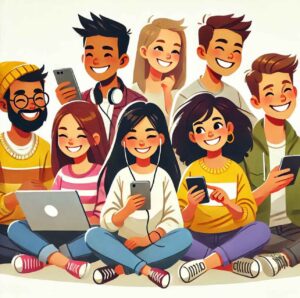

Digital friendship has undeniably become a cornerstone of modern connection. We’ve all experienced this shift, perhaps even recognized it on the silver screen. Films like ‘You’ve Got Mail‘ presaged a reality where meaningful bonds could form through digital exchanges, a concept now fully realized in our daily lives. The fundamental nature of friendship, a constant in human experience, has been profoundly altered by the pervasive influence of technology. It extends beyond mere social media interactions; it encompasses how we cultivate and maintain relationships.
This article will examine the multifaceted impact of these tools, exploring both the advantages and challenges they present. We’ll utilize cinematic examples to illustrate these points, acknowledging that popular culture often mirrors the complexities of our evolving social landscape. As societal norms adapt to technological advancements, our approach to friendship has rapidly transformed in the digital era. The speed and scope of this evolution have introduced novel dynamics into our interpersonal connections, which warrant careful consideration.
Social media platforms like Facebook have reshaped how we form and maintain friendships in the digital world.
1. The Social Network (2010) – The Rise of Virtual Friendships
Social media, especially platforms like Facebook, has changed the game. Suddenly, everyone is connected to everyone, whether you’ve met them or not.
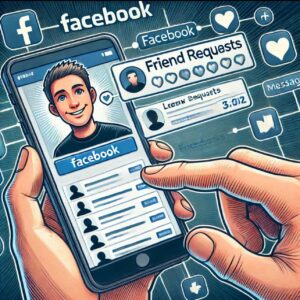
And you know, even Hollywood saw this coming. Remember the movie The Social Network? It’s the story of how Facebook started and shows how quickly things changed. Mark Zuckerberg’s idea was to connect everyone globally. Well, it worked, and it changed how we make friendships.
It’s wild to think about how much things have shifted.
We all know staying in touch now is easier than ever. It’s not just about scrolling through feeds; technology has changed how we keep friendships going, especially when life pulls us apart.
Instant Connection- Video calls mean you can practically be in the same room as your friend, even if they’re on the other side of the world. No more waiting for expensive phone calls or snail mail.
Messaging apps?- They’re like constant little check-ins. A quick “thinking of you” or a funny meme can keep a friendship feeling alive, no matter the miles.
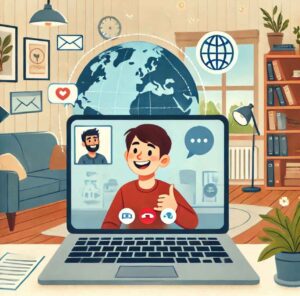
Now, movies have even shown us some wild examples of this.
2. “Her” (2013)- Digital Bonds, Even if Unconventional
That movie, “Her,” might seem a bit out there, with a guy falling for an AI. But it shows how technology can create powerful connections, even unexpectedly. The point is that tech lets us build relationships that break down traditional barriers, whether distance or something else entirely.
3. “You’ve Got Mail” (1998)- Real Talk, Real Support
Remember “You’ve Got Mail?” It’s a classic example of how digital chats can lead to deep friendships, even when people haven’t met face-to-face. It highlights how, when life gets tough, online connections can be a real lifeline. Sharing your struggles and getting support through a screen can be incredibly powerful. Digital platforms let us share the good and bad times, an essential part of friendship.
Technology gives us tools to keep friendships strong, even when life tries to pull us apart. It’s not perfect, but it makes staying connected much more straightforward.
We all know technology is supposed to bring us closer, right? But let’s be honest: It can also wrench our friendships if we’re not careful. Movies like Disconnect and The Circle show us the messy side of it all. It’s not all sunshine and virtual rainbows.
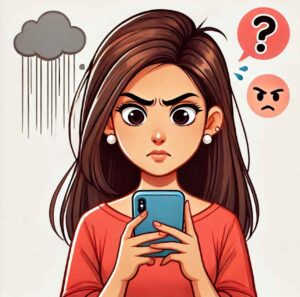
4. Disconnect (2012) – The Isolation Behind the Screen
Do you know that feeling when everyone’s in the same room but also their little digital world? ‘Disconnect’ hits that hard. It shows how easily we can get lost behind screens and how that can seriously mess with our friendships. It’s not just about spending too much time online; it’s about how digital communication can lead to misunderstandings. Like, those times when a text gets misinterpreted or a simple comment blows up into a huge fight? This movie shows that, and it’s a reminder that we need to be mindful of how we use tech so it doesn’t end up pushing our friends away.
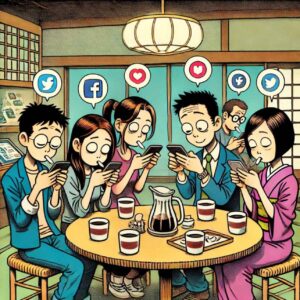
5. The Circle (2017) – The Fine Line Between Connection and Superficiality
Have you ever wondered if social media is making us more connected or just more… fake? ‘The Circle tackles that debate headfirst. It’s like a wild, social media-driven reality show, making you think about how we present ourselves online. We’re all familiar with the perfectly curated photos and highlight reels, right? Well, this movie shows the potential downside.
Finding that balance between enjoying social media’s connections and making sure we’re still building real, meaningful friendships is a wake-up call.
We live in a world where ‘friend’ can mean someone you’ve known since kindergarten or someone you only know through a screen. And it’s a bit of a wild ride trying to figure out how it all works. Technology has completely changed how we do friendships, and it’s not all sunshine and roses. It’s important to remember that the tools themselves aren’t good or bad; it comes down to how we use them.
The truth is that friendships have permanently changed with the times. But the digital age has thrown us a curveball, speeding things up and adding a new layer of complexity.
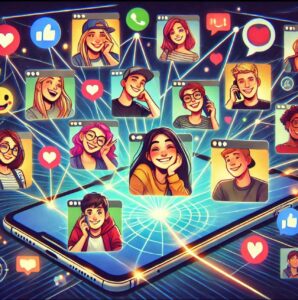
6. Black Mirror: Nosedive (2016) – The Pressure of Social Approval
In this episode of Black Mirror, society operates on a rating system where social interactions are constantly judged. This extreme yet eerily realistic scenario reflects how social media pressures us to maintain an idealized image of friendship rather than forming authentic bonds. It highlights the dangers of prioritizing digital validation over genuine human connections.
7. Ready Player One (2018) – Virtual Friendships vs. Real-Life Bonds
This movie explores a world where friendships exist mainly in a virtual reality. While online friendships can be just as meaningful, Ready Player One reminds us that real-life experiences and physical interactions are irreplaceable. Technology can enhance friendships, but it shouldn’t wholly replace in-person connections.
8. Eighth Grade (2018) – Growing Up in the Digital Age
This coming-of-age movie tackles a young girl’s struggles navigating social media, online friendships, and self-image. It portrays how younger generations experience friendships through a screen, highlighting both the benefits and challenges of growing up in the digital era.
9. Searching (2018) – The Role of Technology in Investigating Connections
In this thriller, a father uses social media and digital tools to search for his missing daughter. While the film focuses on a mystery, it also showcases how technology can help maintain relationships, uncover hidden aspects of someone’s life, and reinforce the idea that digital footprints reveal more than we might think.
10. Jexi (2019) – When Technology Replaces Real Friendships
In Jexi, a man becomes overly dependent on his AI assistant, leading to strained real-life relationships. This comedic yet insightful movie explores how excessive reliance on digital devices can hinder genuine human interactions. While technology is helpful, friendships require effort beyond just texts and likes.
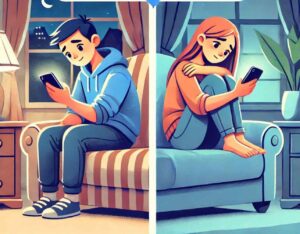
Our friendships are riding the tech wave, changing how we connect, plain and simple. We live in a world where a quick text can bridge miles, but we’ve also seen how easily a screen can get in the way of a real heart-to-heart. It’s all about finding that sweet spot where tech helps us stay close without losing that human touch.
Friendship is still friendship. It’s about having people who get you and who are there through thick and thin, whether you’re chatting online or grabbing coffee in person. And just like friendships have always adapted, they’ll keep doing their thing, even as tech keeps changing. We just have to make sure we’re using these tools to build stronger bonds, not weaker ones.
So, let’s not let the digital world replace the real one. Let’s use it to make our connections even better. What’s one small thing you can do today to connect with a friend more meaningfully, either online or in person? Share your ideas in the comments below – let’s inspire each other to keep those friendships strong! Voila! Until next time!
Fincher, D. (Director). (2010). The Social Network [Film]. Columbia Pictures.
Jonze, S. (Director). (2013). Her [Film]. Warner Bros. Pictures.
Ephron, N. (Director). (1998). You’ve Got Mail [Film]. Warner Bros.
Rubin, H. (Director). (2012). Disconnect [Film]. LD Entertainment.
Ponsoldt, J. (Director). (2017). The Circle [Film]. EuropaCorp.
Brooker, C. (Creator). (2016). Black Mirror: Nosedive [Episode]. Netflix.
Spielberg, S. (Director). (2018). Ready Player One [Film]. Warner Bros.
Burnham, B. (Director). (2018). Eighth Grade [Film]. A24.
Chaganty, A. (Director). (2018). Searching [Film]. Sony Pictures.
Lucas, J. (Director). (2019). Jexi [Film]. CBS Films.